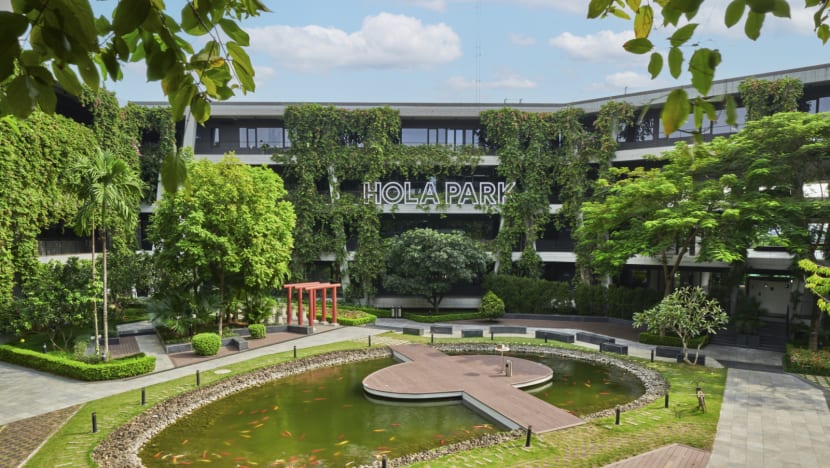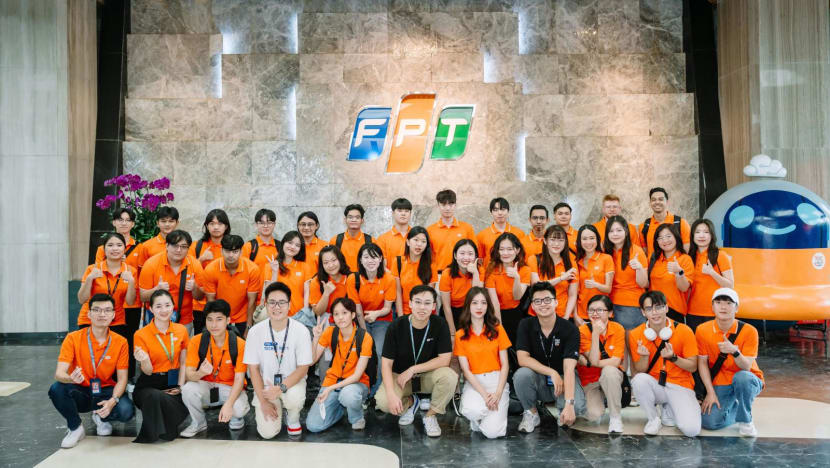Vietnam’s evolution as a hub for tech innovation and agility
FPT is leveraging a skilled workforce and advanced technologies to drive digital transformation across industries.

Vietnam’s vibrant information and communications technology sector is supported by over 70,000 firms. Photos: Shutterstock and FPT; video: FPT

This audio is generated by an AI tool.
Vietnam is rapidly emerging as one of Southeast Asia’s most dynamic economies, driven by a young and educated workforce that is making its mark on the global tech and business landscape.
Despite global uncertainties and shifting trade dynamics, the country has maintained its stability and robust growth. In the first half of 2024, Vietnam’s economy grew by 6.42 per cent, making it among the 20 fastest-growing in the world.
A strong focus on technology and innovation is helping position Vietnam as a rising force in the information and communications technology (ICT) and semiconductor industries.
AN EXPANDING LANDSCAPE OF EMERGING TECHNOLOGIES
Supported by over 70,000 tech firms, Vietnam’s ICT sector has seen significant growth, with revenues surging from US$60.9 billion (S$78.9 billion) in 2016 to US$154 billion in 2023.
Vietnam’s skilled tech professionals, coupled with its national digital transformation vision, have made the country an attractive hub for emerging talent, as well as research and development. Global tech giants such as Amazon, Samsung, Sumitomo Corporation and Lego have established operations here to leverage the potential of advanced technologies.
The country’s strides in AI (artificial intelligence) readiness, ranking 39th globally last year, and its ambitions to become a major contributor to the global semiconductor value chain by 2045, highlight its growing technological momentum.
Vietnam-headquartered FPT is playing a key role in shaping the country’s global standing. Earlier this year, FPT signed a memorandum of understanding with American tech multinational corporation Nvidia to invest US$200 million in a factory aimed at boosting AI and cloud capabilities.
In 2022, FPT launched FPT Semiconductor to support the nation’s growth in chip design. Its private learning institution, FPT University, also recently established its Semiconductor Circuit Faculty, which will provide training programmes for undergraduate and postgraduate students from 2024. “Typically, it takes 18 months for a software engineer to transition to chip design,” said Dr Truong Gia Binh, FPT’s chairman. “With the right approach, Vietnamese software engineers can make that leap in just three months.”
AN AGILE APPROACH TO GLOBAL BUSINESS INNOVATION

With free trade agreements covering 56 markets, Vietnam has become a prime destination for foreign direct investment, which rose to US$36.1 billion last year – a 32 per cent year-on-year increase. Additionally, Vietnam ranked seventh in the 2023 Global Service Location Index, which measures the attractiveness of offshoring destinations. Notably, it is one of only five countries to attract over 10 per cent of global greenfield investment since 2017.
Global companies are increasingly turning to Vietnam to diversify their operations, drawn by its strategic location, skilled workforce and pro-business policies. FPT harnesses these advantages through its “best-shore” delivery model, which integrates onshore, near-shore and offshore capabilities.
This approach enables FPT to strike a balance between cost efficiency, talent availability and proximity to clients. This, in turn, helps businesses boost operational agility, foster innovation and respond swiftly to market changes.
A successful collaboration with Japanese ICT solutions provider Sysmex illustrates this. FPT Software worked with Sysmex to develop Caresphere AM, an application that displays the real-time status of target analysers, which are devices or systems that monitor and assess key data points to support customers’ operations. FPT Software also recommended adopting Agile development and provided valuable input on technology, processes and security, leading Sysmex to adopt DevOps pipelines and iterative development practices.
INVESTING IN FUTURE TECH TALENT

With a median age of 33.1 years, Vietnam’s youthful population produces 57,000 information technology (IT) graduates annually, making it a major source of IT talent worldwide. Over one million Vietnamese work in this sector, highlighting the country’s growing influence in the industry.
Recognising that innovation is driven by people, FPT is keen to nurture future tech talent.
To address its own IT talent shortage, FPT founded FPT University, which focuses on specialised training in high-growth sectors like AI, semiconductors and automotive. Its graduates – more than 170,000 to date – are key to bolstering Vietnam’s workforce and positioning the country as a hub for digital innovation.
FPT’s commitment to fostering future talent extends beyond Vietnam through initiatives like the FPT Global Internship, now in its second edition. The programme invites select international university students pursuing degrees in IT or related fields to the company’s campuses in Hanoi and Da Nang City, where they tackle real-world challenges in areas like AI, cloud, data and cybersecurity, benefitting from mentorship and networking opportunities with FPT’s technical experts.
The internship is one of several workforce development initiatives offered by FPT. “Attracting local talents in key markets across Asia Pacific, Europe and North America is critical for fuelling growth and expanding the global pool of highly skilled tech professionals,” said Mr Nguyen Tuan Minh, chief human resources officer of FPT Software.
By fostering a skilled workforce and leveraging emerging technologies, FPT is helping businesses worldwide enhance their agility and accelerate digital transformation.
Learn how FPT drives digital innovation in Vietnam and around the world.















